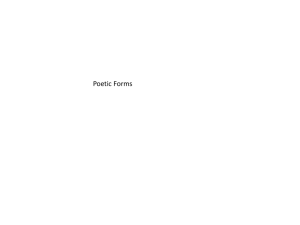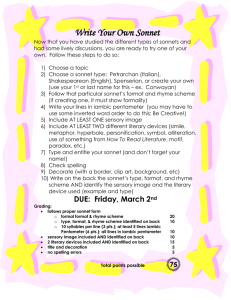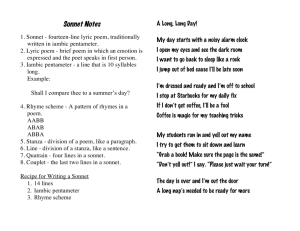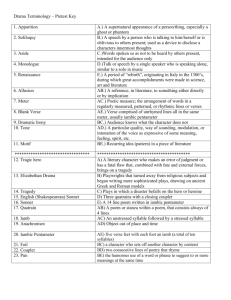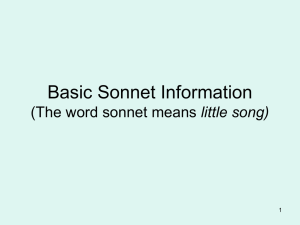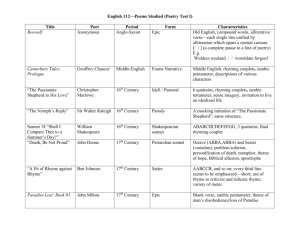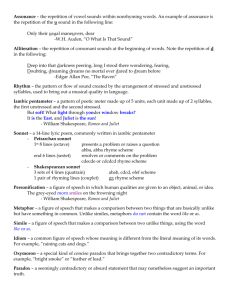What is a sonnet? Review
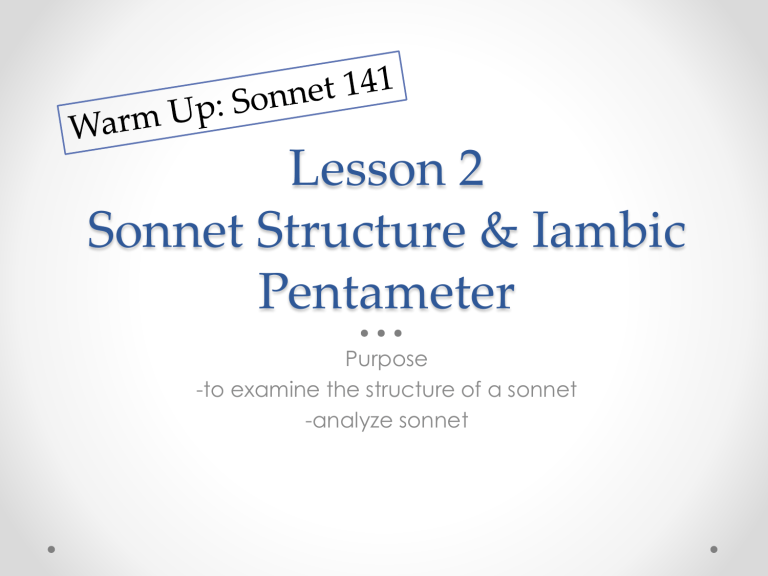
Lesson 2
Sonnet Structure & Iambic
Pentameter
Purpose
-to examine the structure of a sonnet
-analyze sonnet
Sonnet 141
Sonnet 141
In faith, I do not love thee with mine eyes,
For they in thee a thousand errors note;
But 'tis my heart that loves what they despise,
Who in despite of view is pleased to dote;
Nor are mine ears with thy tongue's tune delighted,
Nor tender feeling, to base touches prone,
Nor taste, nor smell, desire to be invited
To any sensual feast with thee alone:
But my five wits nor my five senses can
Dissuade one foolish heart from serving thee,
Who leaves unsway'd the likeness of a man,
Thy proud heart's slave and vassal wretch to be:
Only my plague thus far I count my gain,
That she that makes me sin awards me pain
10 Things I Hate About You
Sonnet 141 Sonnet 141 (Derivative Version)
In faith, I do not love thee with mine eyes,
For they in thee a thousand errors note;
But 'tis my heart that loves what they despise,
Who in despite of view is pleased to dote;
Nor are mine ears with thy tongue's tune delighted,
Nor tender feeling, to base touches prone,
Nor taste, nor smell, desire to be invited
To any sensual feast with thee alone:
But my five wits nor my five senses can
Dissuade one foolish heart from serving thee,
Who leaves unsway'd the likeness of a man,
Thy proud heart's slave and vassal wretch to be:
Only my plague thus far I count my gain,
That she that makes me sin awards me pain
I hate the way you talk to me,
And the way you cut your hair.
I hate the way you drive my car.
I hate it when you stare.
I hate your big dumb combat boots,
And the way you read my mind.
I hate you so much it makes me sick.
(It even makes me rhyme.)
I hate the way you’re always right.
I hate it when you lie.
I hate it when you make me laugh—
Even worse when you make me cry.
I hate it when you’re not around, and the fact that you didn’t call.
But mostly I hate the way I don’t hate you— not even close, not even a little bit, not even at all.
http://bardfilm.blogspot.com/2009/02/sonnets-in-ten-things-i-hateabout-you.html
What is a sonnet? Review
Sonnet: 14 line poem that rhymes in a certain pattern
A sonnet is a poem made up of three quatrains (in iambic pentameter) followed by a concluding couplet. It has a total of 14 lines with a rhyme scheme of abab, cdcd, efef, gg.
Shakespeare’s Sonnets
Shakespeare wrote 154 sonnets.
His sonnets are numbered, not titled.
All are in iambic pentameter .
Shakespeare’s Sonnets
• Most of Shakespeare’s sonnets are speaking to a handsome young lord.
• Shakespeare advises and praises him.
• The other sonnets are speaking to or about
Shakespeare’s mistress.
• She also became the young lord’s mistress.
She is also referred to as a “dark lady,” meaning that her features (hair, eyes) are dark.
What goes in a sonnet?
Review
• Quatrain: 4 lines grouped together by a certain rhyme pattern
• Couplet: 2 lines that rhyme
Quatrain
A quatrain is four lines of verse with this rhyme scheme:
A-B-A-B, meaning that the first and third, and second and fourth lines rhyme.
The QUATRAINS of the English sonnet present an idea,
problem, or story.
What goes in a sonnet?
Review
Rhyming Couplet
A couplet is two lines of verse that rhyme. To borrow from the example above, the lines would have an "A-
A" rhyme scheme.
The COUPLET either summarizes the
sonnets or gives surprise ending.
Abab
English Sonnet
cdcd efef
Quatrain
Quatrain
Quatrain
Couplet gg
Iambic Pentameter
Each line of a sonnet has ten syllables.
Each line also has a certain rhythm, called iambic pentameter.
.
Iambic Pentameter
Iambic pentameter is made of 5 sets of unstressed and stressed syllables.
(i.e. U S U S U S U S U S)
STRESSED SYLLABLES are
emphasized when spoken.
Iambic Pentameter
Stressed syllables are marked with
Unstressed syllables are marked with
Iambic Pentameter
Mark iambic pentameter for the following line:
Two households both alike in dignity
In faith, I do not love thee with mine eyes,
For they in thee a thousand errors note;
But 'tis my heart that loves what they despise,
Who in despite of view is pleased to dote;
Things to Look for when
Reading a Sonnet
• Rhyme scheme
• abab cdcd efef gg
• quatrains and couplet
• Form
• Meaning
• Iambic pentameter
• 10 syllables per line
• Alternating unstressed and stressed syllable
Sonnet 29
When, in disgrace with fortune and men's eyes,
I all alone beweep my outcast state
And trouble deaf heaven with my bootless cries
And look upon myself and curse my fate,
Wishing me like to one more rich in hope,
Featured like him, like him with friends possess'd,
Desiring this man's art and that man's scope,
With what I most enjoy contented least;
Yet in these thoughts myself almost despising,
Haply I think on thee, and then my state,
Like to the lark at break of day arising
From sullen earth, sings hymns at heaven's gate;
For thy sweet love remember'd such wealth brings
That then I scorn to change my state with kings.
Sonnet 29 - Modern
When I’m in disgrace with everyone and my luck has deserted me, I sit all alone and cry about the fact that I’m an outcast, and bother God with useless cries, which fall on deaf ears, and look at myself and curse my fate, wishing that I had more to hope for, wishing I had this man’s good looks and that man’s friends, this man’s skills and that man’s opportunities, and totally dissatisfied with the things I usually enjoy the most. Yet, as I’m thinking these thoughts and almost hating myself, I happen to think about you, and then my condition improves—like a lark at daybreak rising up and leaving the earth far behind to sing hymns to God. For when I remember your sweet love, I feel so wealthy that I’d refuse to change places even with kings.
